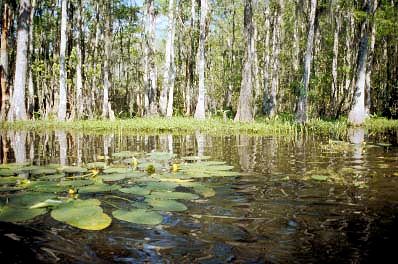 Forested swamps are habitat to many species of plants and animals and protect water quality and recharge groundwater. Federal wetlands rules allow only minor ditching through them without a permit. Photo: Tulane University Forested swamps are habitat to many species of plants and animals and protect water quality and recharge groundwater. Federal wetlands rules allow only minor ditching through them without a permit. Photo: Tulane University |
MAYSVILLE — As the federal investigation continues into possible wetland violations at the sprawling Hofmann Forest in Onslow and Jones counties, opponents of N.C. State University’s proposed sale of its research forest ramped up their multi-pronged public relations offensive.
That effort includes an online petition, a Facebook page and a letter-writing campaign to university officials and to state Attorney General Roy Cooper. Opponents hit a bump in the road Tuesday, however, when the university’s faculty senate failed to adopt a resolution opposing the sale that a forestry professor had
introduced.
Supporter Spotlight
The $150 million sale of the forest to an Illinois agricultural corporation is set to close on June 30. Long a research site for students, faculty and others, the 79,000-acre Hofmann is home to the headwaters of the White Oak, Trent and New rivers.
Fred Cubbage, the forestry professor, is also a plaintiff in a lawsuit to require an environmental assessment of the property before the sale can be closed. He is also the former head of the NCSU Department of Forestry and Environmental Resources. Cubbage succeeded in getting the resolution placed on the agenda for the
senate meeting Tuesday afternoon on campus, but said he was barely allowed to speak.
“They (the school officials) talked like this was a windfall or a boon for the university and mentioned that it was almost as much as the whole budget of the college (of natural resources),” Cubbage added.
“There wasn’t any talk of sustainability or why we teach management of resources.”
The resolution was referred to a senate faculty committee, he said. Cubbage didn’t detect any enthusiasm among other faculty members to address it. “It wasn’t tabled, so technically it can come back, but I really don’t see that happening,” he added. “I had thought we had a 50-50 chance, but I think I was wrong.”
On the regulatory front, Mickey Sugg, a regulator with the Wilmington District of the Army Corps of Engineers, said Monday that his office is still trying to get more historical information from the university about ditching activities in the forest. The Corps, Sugg said, will soon hand the case over to the U.S. Environmental Protection Agency for a final determination.
Supporter Spotlight
The Corps and EPA officials will likely visit the forest before deciding whether wetlands were illegally ditched, Sugg said.
He had told Coastal Review Online in early February and other media since then that some wetland rules appear to have been violated in the Hofmann.
 Ron Sutherland Ron Sutherland |
The Corps’ investigation began early this year after the N.C. Coastal Federation asked for information about ditching activities in the forest. The request was triggered by an “investors’ prospectus” that surfaced late last year after N.C. State shocked many by announcing the pending sale. The document raised numerous questions about what the new owners would do with the land; it outlines commercial and residential development on thousands of acres, calling into question assurances from the prospective new owner that it would maintain most of the forest for research and timber management and sales, and not convert it to agricultural, commercial and residential uses.
The prospectus noted that more than 5,500 acres in the Hofmann had been clear cut and could easily be converted to agriculture.
Sugg, who visited the forest in early February after the federation’s request, said at the time that the key issues appear to be the property owner’s interpretation of how some forestry techniques relate to a Corps’ exemption for minor drainage ditching. The Corps allows minor ditching without a permit to promote and enhance the growth of trees that are sold to generate income.
More substantial ditching, which draws down the water table to allow the planting and harvesting of crops would require a permit, Sugg said.
Some of the areas where ditches have been constructed, Sugg said, “appear to have been really wet,” and it’s possible that those ditches have contributed to the conversion of wetlands to uplands.
That’s where the EPA would come in, Sugg said. The agency has oversight on determining if ditching activity violates the federal Clean Water Act, he said.
Cubbage said Wednesday that it appears that the university is very concerned about possible wetlands violations. He said he’s been told by another forestry professor that as many as 50 surveyors had been on the property shortly after the Coastal Review Online
published its story.
 The Dogwood Alliance is one of the many environmental groups in the state opposed to the sale of the Hofmann Forest. Photo: Dogwood Alliance The Dogwood Alliance is one of the many environmental groups in the state opposed to the sale of the Hofmann Forest. Photo: Dogwood Alliance |
“It was not a forestry inventory, because we’d already had that done,” he said.
Sugg said if violations have occurred, potential federal penalties could include requirements for remedial work and restoration, fines or
both.
Sugg also said that if the sale of the property occurs before the investigation is complete and enforcement actions are taken, it’s
not entirely clear whether those actions would be against N.C. State and its foundation or against the buyer, Hofmann Forest LLC.
All of this is going on as a court case involving the sale slowly grinds on. Wake County Superior Court, in a decision in December, granted the university foundation board’s motion to dismiss a lawsuit to require the state to do an environmental assessment under the N.C. Environmental Policy Act before the $150 million sale can take place. The legal complaint was brought by a coalition of foresters,
conservationists and others in September. They have appealed the judge’s ruling. One of the plaintiffs, Ron Sutherland, a
conservation scientist with the Durham-based Wildlands Network, said Friday that the opponents are still preparing their brief for the
appeal court.
But he noted that the plaintiffs are also doggedly pursuing the option of trying to convince the university and its foundation to pull out of the sale. To that end, he said he and the others were buoyed by recent resolutions adopted by the state chapter of the Sierra Club and the Audubon Society opposing the sale.
Along with the countless letters and emails sent to N.C. State officials, opponents of the sale, as of last week, had sent more than 4,000 letters urging Cooper to require that the state Environmental Policy Act be enforced so that an environmental assessment is required before the sale can take place. Cooper’s office has been defending the seller, although NCSU has contended in court that the land is not state property, since it’s owned by the school’s endowment fund.
 Fred Cubbage Fred Cubbage |
“I think public opposition has been growing steadily, and I hope it makes a difference,” Sutherland said. “It clearly shows that when people are aware of what’s going on and aware of the importance of the forest, they don’t like the idea of selling the forest to a private agricultural concern that could have a green light to develop it.”
Noelle Talley, spokesperson for the attorney general’s office, declined Tuesday to comment, except to note that it’s the “duty of the attorney general’s office to defend state agencies and universities when they get sued in court.”
Cubbage said that regardless of how the court case turns out, he thinks the school has “lost the moral ground,” as evidenced by strong and growing public opposition to any sale that would alter the forest significantly.
“A lot of people don’t know much about it,” he said. “But anyone who does know about it – expect for those few who think they might
be able to make a buck out of it – hate it, hate it, hate it.”
Cubbage said he continues to think that the new owner, a farmer, will convert much of the forest to cropland and lease or sell other parts because he will have to recoup his investment. The university and its foundation, he said, will lose credibility when that happens because development of the forest would belie the oft-stated commitment to
sustainability and environmental stewardship.
More importantly, he said, if the sale is completed, the environment will suffer because of the giant forest’s ability to suck up pollutants before the reach the headwaters of the coastal rivers. And a great resource will eventually be lost to the state and the school’s forestry students, despite assurances to the contrary.
“The clear-cutting, root raking, bulldozing and conversion of everything in a land area almost as large as Raleigh will destroy the forest, kill most wildlife, damage water quality in the Trent, New, and White Oak, and hurt the coast, in the immediate area and in all surrounding waters and farms,” he said.







